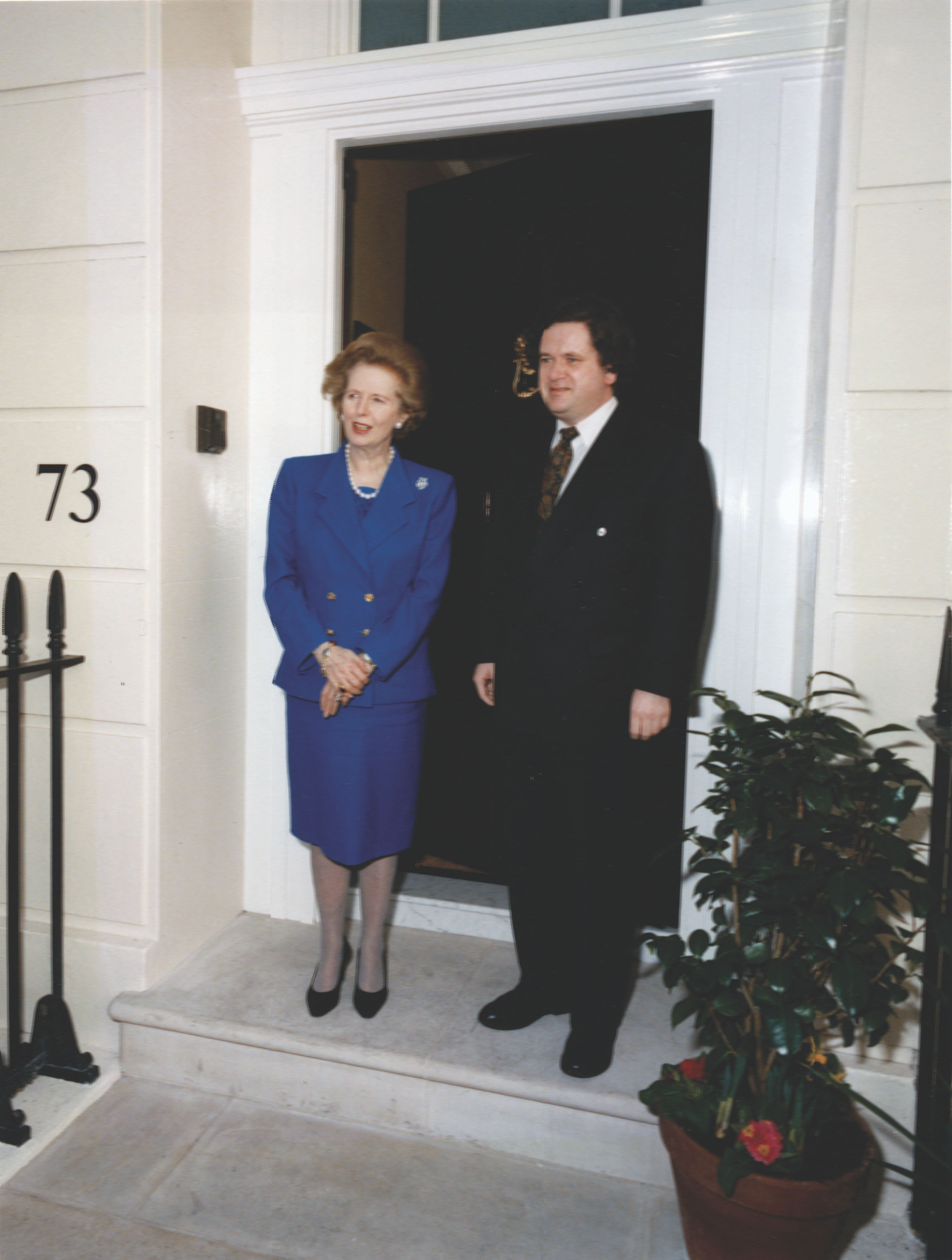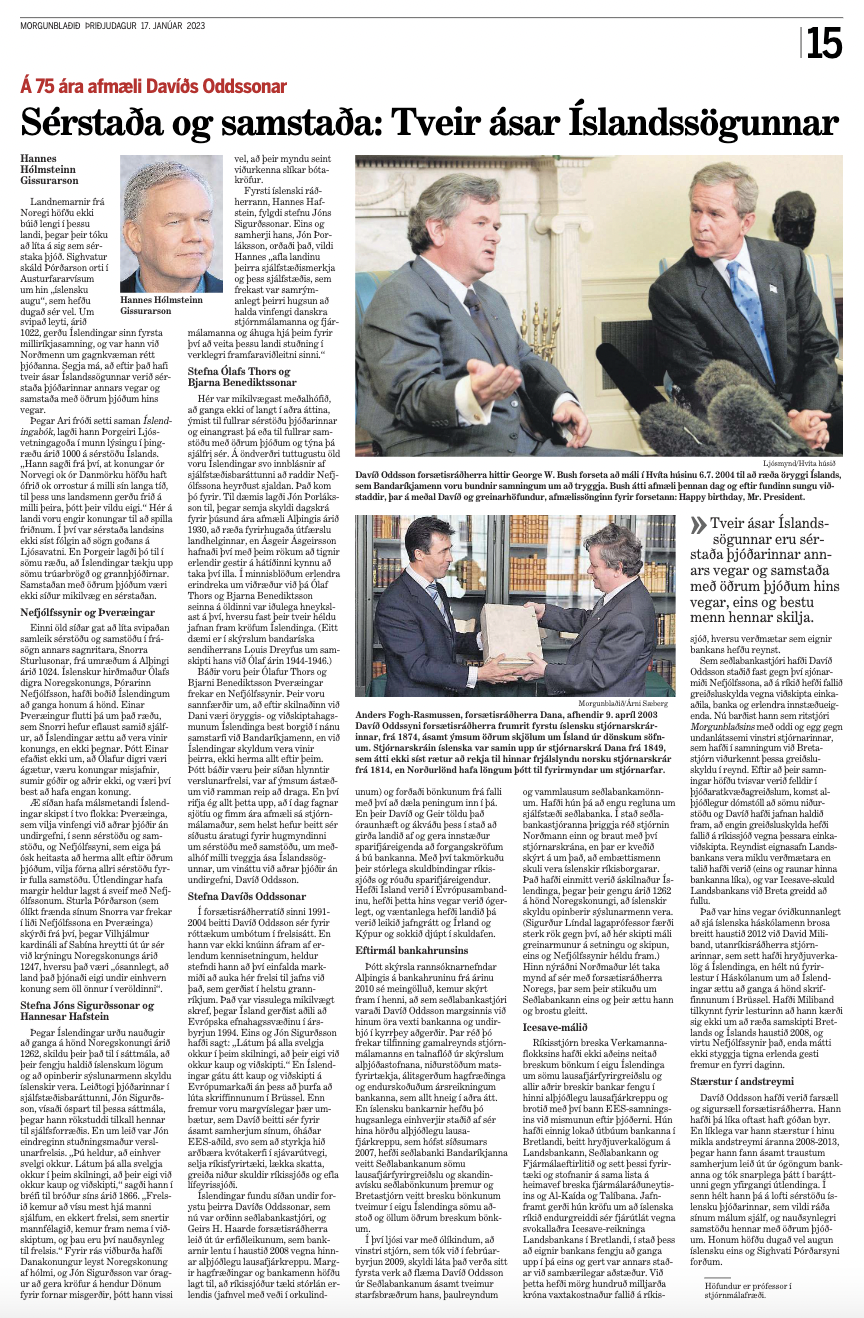David Oddsson who is the longest-serving prime minister in Icelandic history, between the spring of 1991 and the autumn of 2004, celebrated his 75th birthday on 17 January 2023. On this occasion RNH Academic Director, Professor Hannes H. Gissurarson, published an analysis of Oddsson’s political views in Morgunbladid, placing him in a long Icelandic tradition which supported friendship with other nations but submission to none. After Iceland had been settled in 874–930, mainly from Western Norway, a Commonwealth was founded and soon the Icelanders had developed a keen sense of their own separate identity. The word ‘Icelandic’ first occurs in a poem by Sighvat Thordson around 1020, and in 1022 Iceland made her first treaty with a foreign power, Norway, on the rights and duties of Icelanders in Norway and of Norwegians in Iceland. In 1024, an Icelander at the court of Norwegian King Olav the Fat, Thorarinn Nefjolfsson, travelled to Iceland and at a meeting of the Parliament at Thingvellir he tried his persuade his compatriots that they should become subjects of the king. Then an Icelandic farmer, Einar from Thvera, called Einar the Thveraeing, gave a famous speech where he said that kings turned out differently, some well and others badly, and that therefore it was best to have no king. The Icelanders should be friends of the Norwegian king, but not his subjects. They should maintain the freedom from royal oppression, high taxes and military adventures, that they had enjoyed since the island was settled.
Ever since, Icelanders have been divided into Nefjolfssons and Thveraeings, Gissurarson said. The Nefjolfssons believe that Icelanders are best off under the protection of a foreign power, in some kind of a shelter provided by others, whereas the Thveraeings hold that the country should cultivate good relations with other nations without completely renouncing her sovereignty. The leaders of Iceland’s independence struggle, Jon Sigurdsson and Hannes Hafstein, were both Thveraeings: Iceland was then a Danish dependency, and they realised that the poor and tiny country had to cooperate with Denmark, not least in order to attract much-needed Danish capital, but at the same time they insisted on self-rule. In 1918, after cordial negotiations Denmark recognised the sovereignty of Iceland which thereupon formed a personal union with the Danish king. During the Second World War, the ties with Denmark were severed and Iceland became a Republic. The two most powerful political leaders of the post-war years, Olafur Thors and Bjarni Benediktsson, were both Thveraeings. They wanted, and got, military protection from the United States while insisting on the country’s sovereignty, and seeking to trade with as many partners as possible. David Oddsson continued their policies as prime minister. He implemented a comprehensive programme of stabilisation, liberalisation, privatisation and tax cuts, while remaining a staunch ally of the United States.
During Iceland’s independence struggle and long after that, not much was heard from the Nefjolfssons. But during the 2008 bank collapse they rose up and wanted to yield to loud demands from the United Kingdom and other European states that Iceland should take responsibility for the financial obligations of the fallen banks. David Oddsson, now Governor of the Central Bank, flatly rejected those demands, and he and Prime Minister Geir H. Haarde instead put the banks into resolution at the same time as they gave deposits priority over other claims on the bank estates, thus averting panic. In the aftermath of the collapse, the Nefjolfssons also fought hard for Iceland to join the European Union instead of remaining in the European Economic Area, with Norway and Liechtenstein, and for all practical purposes, with Switzerland. Now Editor of Iceland’s leading newspaper, Morgunbladid, Oddsson fought hard and successfully against submission to the Brussels bureaucracy. His 75th birthday was celebrated at a large dinner party at the Editions Hotel in Reykjavik, attended by four other past and present prime ministers, Katrin Jakobsdottir, Bjarni Benediktsson, Sigmundur D. Gunnlaugsson and Geir H. Haarde.




